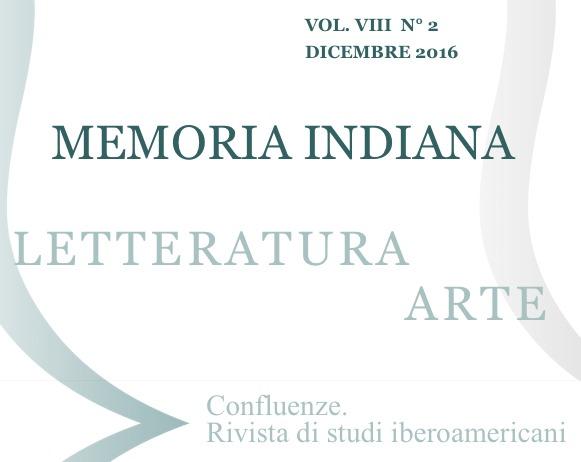Huellas del universo guaraní en la memoria escrita del paraguayo Augusto Roa Bastos
DOI:
https://doi.org/10.6092/issn.2036-0967/6645Parole chiave:
Paraguay, guaraní, orality/writings, myth, fiction,Abstract
Marcel Dominguez (1868-1936) wrote on the history of Paraguay, valuing the traces of the indigenous peoples; Eloy Fariña Núñez (1885-1929) interpreted the poetic dimensions of the Guaraní universe, composing the "Secular Canto"; The anthropologists Kurt Unkel (1883-1945), Leon Cadogan (1899-1973) and Bertomeu Meliá (1932) showed an interest in those same people, exploring their roots and ways of life. In Augusto Roa Bastos’ works, an awareness of historical order, similar poetic dimensions and human reach is once again represented. All this is done through a language where, without "alibis or civilizing betrayals", he tells the good use of myths, allowing us to read the reality, all our reality. The genesis of the Guarani (1948), Son of Man (1960), (1993) confirm Roa’s success, a writer who speaks of his Guaraní legacy, Yo el Supremo (1974) and El Fiscal handles from his writing a colonial heritage and expiate with words of a common language the memory of Miguel Vera, the records of an anonymous compiler and the notes of the outlaw Felix Moral.Downloads
Pubblicato
2016-12-31
Come citare
Tovar Blanco, P. (2016). Huellas del universo guaraní en la memoria escrita del paraguayo Augusto Roa Bastos. Confluenze. Rivista Di Studi Iberoamericani, 8(2), 75–89. https://doi.org/10.6092/issn.2036-0967/6645
Fascicolo
Sezione
DOSSIER
Licenza
Copyright (c) 2016 Paco Tovar Blanco
I diritti d'autore e di pubblicazione di tutti i testi nella rivista appartengono ai rispettivi autori senza restrizioni.
La rivista è rilasciata sotto una licenza Creative Commons Attribuzione 4.0 Internazionale (codice legale completo).
Vedere inoltre la nostra Open Access Policy.
Metadati
Tutti i metadati dei materiali pubblicati sono rilasciati in pubblico dominio e possono essere utilizzati da ognuno per qualsiasi scopo. Questi includono i riferimenti bibliografici.
I metadati – riferimenti bibliografici inclusi – possono essere riutilizzati in qualsiasi formato senza ulteriori autorizzazioni, incluso per scopo di lucro. Chiediamo cortesemente agli utenti di includere un collegamento ai metadati originali.






